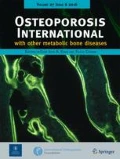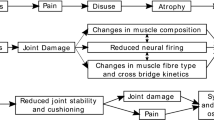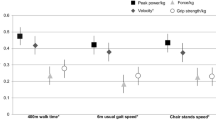Abstract
Summary
Improved approaches to assess functional change over time are needed to optimally reduce fall/fracture risk; jumping mechanography (JM) may be one such methodology. In this study, JM parameters were more reproducible than traditional functional tests. JM may be better able to demonstrate efficacy of interventions to mitigate sarcopenia.
Introduction
Jumping mechanography (JM), a tool using maximal countermovement jumps performed on a force plate, may more reliably assess muscle function than traditional methods. The purpose of this study was to examine JM retest reliability in older adults compared with commonly used muscle and physical function assessments.
Methods
Community-dwelling individuals age ≥70 years performed physical and muscle function assessments including the short physical performance battery (SPPB), grip strength, and JM on multiple occasions over 3 months. JM parameters included body weight-corrected peak power and jump height. Appendicular lean mass was measured by dual energy x-ray (DXA). Mixed effects linear regression models were used to estimate between- and within-person variability summarized as intra-class correlation coefficients (ICC).
Results
Ninety-seven individuals (49 females, 48 males, mean age 80.7 years) participated. All testing was well tolerated; no participant sustained injury. Jump power, height, and grip strength were greater (p < 0.0001) in men than women. Grip strength, jump power, and height had excellent ICCs (0.95, 0.93, and 0.88, respectively); chair rise, SPPB score, and gait speed had lower ICCs (0.81, 0.77, and 0.76, respectively).
Conclusion
In older adults, JM has excellent retest reliability, is stable over time, and can be performed safely. JM retest reliability was comparable to grip strength and possibly better than SPPB and gait speed. JM is a promising tool for muscle function assessment in older adults. Comparison of this approach with traditional assessment tools in longitudinal interventional studies is needed.
Similar content being viewed by others
References
Kelly TL, Wilson KE, Heymsfield SB (2009) Dual energy X-ray absorptiometry body composition reference values from NHANES. PLoS One 4:e7038
Cawthon PM, Fullman RL, Marshall L, Mackey DC, Fink HA, Cauley JA, Cummings SR, Orwoll ES, Ensrud KE (2008) Physical performance and risk of hip fractures in older men. J Bone Miner Res 23:1037–1044
Rosenberg IH (1989) Epidemiologic and methodologic problems in determining nutritional status of older persons. (Summary comments). Am J Clin Nutr 50:1231–1233
Rosenberg IH (1997) Sarcopenia: origins and clinical relevance. J Nutr 127:990S–991S
Baumgartner RN, Koehler KM, Gallagher D, Romero L, Heymsfield SB, Ross RR, Garry PJ, Lindeman RD (1998) Epidemiology of sarcopenia among the elderly in New Mexico. Am J Epidemiol 147:755–763
Janssen I, Baumgartner RN, Ross R, Rosenberg IH, Roubenoff R (2004) Skeletal muscle cutpoints associated with elevated physical disability risk in older men and women. Am J Epidemiol 159:413–421
Correa-de-Araujo R, Hadley E (2014) Skeletal muscle function deficit: a new terminology to embrace the evolving concepts of sarcopenia and age-related muscle dysfunction. J Gerontol A Biol Sci Med Sci 69:591–594
Koster A, Ding J, Stenholm S et al (2011) Does the amount of fat mass predict age-related loss of lean mass, muscle strength, and muscle quality in older adults? J Gerontol A Biol Sci Med Sci 66:888–895
Lang T, Cauley JA, Tylavsky F, Bauer D, Cummings S, Harris TB (2010) Computed tomographic measurements of thigh muscle cross-sectional area and attenuation coefficient predict hip fracture: the health, aging, and body composition study. J Bone Miner Res 25:513–519
Visser M, Goodpaster BH, Kritchevsky SB, Newman AB, Nevitt M, Rubin SM, Simonsick EM, Harris TB (2005) Muscle mass, muscle strength, and muscle fat infiltration as predictors of incident mobility limitations in well-functioning older persons. J Gerontol A Biol Sci Med Sci 60:324–333
Hairi NN, Cumming RG, Naganathan V, Handelsman DJ, Le Couteur DG, Creasey H, Waite LM, Seibel MJ, Sambrook PN (2010) Loss of muscle strength, mass (sarcopenia), and quality (specific force) and its relationship with functional limitations and physical disability: The Concord health and ageing in men project. J Am Geriatr Soc 58:2055–2062
Cawthon PM, Fox KM, Gandra SR et al (2009) Do muscle mass, muscle density, strength, and physical function similarly influence risk of hospitalization in older adults? J Am Geriatr Soc 57:1411–1419
Newman AB, Kupelian V, Visser M, Simonsick EM, Goodpaster BH, Kritchevsky SB, Tylavsky FA, Rubin SM, Harris TB (2006) Strength, but not muscle mass, is associated with mortality in the health, aging and body composition study cohort. J Gerontol A Biol Sci Med Sci 61:72–77
Studenski SA, Peters KW, Alley DE et al (2014) The FNIH sarcopenia project: rationale, study description, conference recommendations, and final estimates. J Gerontol A Biol Sci Med Sci 69:547–558
Dam TT, Peters KW, Fragala M et al (2014) An evidence-based comparison of operational criteria for the presence of sarcopenia. J Gerontol A Biol Sci Med Sci 69:584–590
Muscaritoli M, Anker SD, Argiles J et al (2010) Consensus definition of sarcopenia, cachexia and pre-cachexia: joint document elaborated by Special Interest Groups (SIG) “cachexia-anorexia in chronic wasting diseases” and “nutrition in geriatrics”. Clin Nutr 29:154–159
Fielding RA, Vellas B, Evans WJ et al (2011) Sarcopenia: an undiagnosed condition in older adults. Current consensus definition: prevalence, etiology, and consequences. International working group on sarcopenia. J Am Med Dir Assoc 12:249–256
Cruz-Jentoft AJ, Baeyens JP, Bauer JM et al (2010) Sarcopenia: European consensus on definition and diagnosis: Report of the European Working Group on Sarcopenia in Older People. Age Ageing 39:412–423
Mijnarends DM, Meijers JM, Halfens RJ, ter Borg S, Luiking YC, Verlaan S, Schoberer D, Cruz Jentoft AJ, van Loon LJ, Schols JM (2013) Validity and reliability of tools to measure muscle mass, strength, and physical performance in community-dwelling older people: a systematic review. J Am Med Dir Assoc 14:170–178
Guralnik JM, Ferrucci L, Simonsick EM, Salive ME, Wallace RB (1995) Lower-extremity function in persons over the age of 70 years as a predictor of subsequent disability. N Engl J Med 332:556–561
Guralnik JM, Ferrucci L, Pieper CF, Leveille SG, Markides KS, Ostir GV, Studenski S, Berkman LF, Wallace RB (2000) Lower extremity function and subsequent disability: consistency across studies, predictive models, and value of gait speed alone compared with the short physical performance battery. J Gerontol A Biol Sci Med Sci 55:M221–M231
Miller DK, Wolinsky FD, Andresen EM, Malmstrom TK, Miller JP (2008) Adverse outcomes and correlates of change in the short physical performance battery over 36 months in the African American health project. J Gerontol A Biol Sci Med Sci 63A:487–494
Guralnik JM, Simonsick EM, Ferrucci L, Glynn RJ, Berkman LF, Blazer DG, Scherr PA, Wallace RB (1994) A short physical performance battery assessing lower extremity function: association with self-reported disability and prediction of mortality and nursing home admission. J Gerontol 49:M85–M94
Dixon WG, Lunt M, Pye SR, Reeve J, Felsenberg D, Silman AJ, O’Neill TW (2005) Low grip strength is associated with bone mineral density and vertebral fracture in women. Rheumatology (Oxford) 44:642–646
Rantanen T, Guralnik JM, Foley D, Masaki K, Leveille S, Curb JD, White L (1999) Midlife hand grip strength as a predictor of old age disability. J Am Med Assoc 281:558–560
Coppin AK, Ferrucci L, Lauretani F, Phillips C, Chang M, Bandinelli S, Guralnik JM (2006) Low socioeconomic status and disability in old age: evidence from the InChianti study for the mediating role of physiological impairments. J Gerontol A Biol Sci Med Sci 61:86–91
Runge M, Rittweger J, Russo CR, Schiessl H, Felsenberg D (2004) Is muscle power output a key factor in the age-related decline in physical performance? A comparison of muscle cross section, chair-rising test and jumping power. Clin Physiol Funct Imaging 24:335–340
Buehring B, Binkley N (2013) Myostatin—the holy grail for muscle, bone, and fat? Curr Osteoporos Rep 11:407–414
Rolland Y, Onder G, Morley JE, Gillette-Guyonet S, Abellan van Kan G, Vellas B (2011) Current and future pharmacologic treatment of sarcopenia. Clin Geriatr Med 27:423–447
Dalton JT, Taylor RP, Mohler ML, Steiner MS (2013) Selective androgen receptor modulators for the prevention and treatment of muscle wasting associated with cancer. Curr Opin Support Palliat Care 7:345–351
Buehring B, Krueger D, Binkley N (2010) Jumping mechanography: a potential tool for sarcopenia evaluation in older individuals. J Clin Densitom 13:283–291
Buehring B, Hind J, Fidler E, Krueger D, Binkley N, Robbins J (2013) Tongue strength is associated with jumping mechanography performance and handgrip strength but not with classic functional tests in older adults. J Am Geriatr Soc 61:418–422
Russo CR, Lauretani F, Bandinelli S, Bartali B, Cavazzini C, Guralnik JM, Ferrucci L (2003) High-frequency vibration training increases muscle power in postmenopausal women. Arch Phys Med Rehabil 84:1854–1857
Hardcastle SA, Gregson CL, Rittweger J, Crabtree N, Ward K, Tobias JH (2014) Jump power and force have distinct associations with cortical bone parameters: findings from a population enriched by individuals with high bone mass. J Clin Endocrinol Metab 99:266–275
Rittweger J, Schiessl H, Felsenberg D, Runge M (2004) Reproducibility of the jumping mechanography as a test of mechanical power output in physically competent adult and elderly subjects. J Am Geriatr Soc 52:128–131
Michaelis I, Kwiet A, Gast U, Boshof A, Antvorskov T, Jung T, Rittweger J, Felsenberg D (2008) Decline of specific peak jumping power with age in master runners. J Musculoskelet Neuronal Interact 8:64–70
Veilleux LN, Rauch F (2010) Reproducibility of jumping mechanography in healthy children and adults. J Musculoskelet Neuronal Interact 10:256–266
Matheson LA, Duffy S, Maroof A, Gibbons R, Duffy C, Roth J (2013) Intra- and inter-rater reliability of jumping mechanography muscle function assessments. J Musculoskelet Neuronal Interact 13:480–486
Wadsworth CT, Krishnan R, Sear M, Harrold J, Nielsen DH (1987) Intrarater reliability of manual muscle testing and hand-held dynametric muscle testing. Phys Ther 67:1342–1347
Chumlea WC, Cesari M, Evans WJ, Ferrucci L, Fielding RA, Pahor M, Studenski S, Vellas B, Members IWGoSTF (2011) Sarcopenia: designing phase IIB trials. J Nutr Health Aging 15:450–455
Abellan van Kan G, Cameron Chumlea W, Gillette-Guyonet S, Houles M, Dupuy C, Rolland Y, Vellas B (2011) Clinical trials on sarcopenia: methodological issues regarding phase 3 trials. Clin Geriatr Med 27:471–482
Acknowledgments
All authors contributed to the study concept and design, acquisition of subjects and data, analysis and interpretation of data, and preparation of manuscript. This work was sponsored by an investigator initiated research grant from Merck & Co., Inc. Merck & Co., Inc and did not have any role in the design, methods, subject recruitment, data collection, analysis, or preparation of paper. Dr. Buehring receives research funding from the John A. Hartford Foundation as a Centers of Excellence in Geriatric Medicine and Geriatric Psychiatry scholar. Dr. Binkley is participating in a multicenter trial with Lilly in functional outcomes in older adults. He also consults on the same project.
Conflicts of interest
None
Author information
Authors and Affiliations
Corresponding author
Rights and permissions
About this article
Cite this article
Buehring, B., Krueger, D., Fidler, E. et al. Reproducibility of jumping mechanography and traditional measures of physical and muscle function in older adults. Osteoporos Int 26, 819–825 (2015). https://doi.org/10.1007/s00198-014-2983-z
Received:
Accepted:
Published:
Issue Date:
DOI: https://doi.org/10.1007/s00198-014-2983-z




